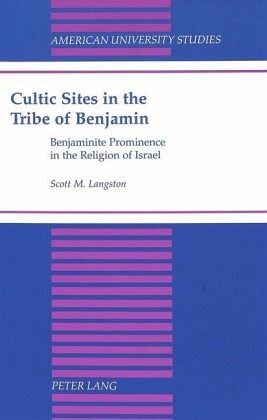Nicht lieferbar

Cultic Sites in the Tribe of Benjamin
Benjaminite Prominence in the Religion of Israel
Versandkostenfrei!
Nicht lieferbar
Although the tribe of Benjamin usually has been considered a relatively minor member of the Israelite tribal coalition, it actually exercised substantial cultic and political influence. Through an analysis of archaeological data and biblical traditions regarding cultic sites located within the tribal area of Benjamin, this study emphasizes Benjamin's prominence during the Iron I and II periods (1200-586 BCE). Although "high places" and other religious sites were found throughout Israel and Judah, those in Benjamin played a dominant role. Early biblical traditions suggest that Benjamin struggle...
Although the tribe of Benjamin usually has been considered a relatively minor member of the Israelite tribal coalition, it actually exercised substantial cultic and political influence. Through an analysis of archaeological data and biblical traditions regarding cultic sites located within the tribal area of Benjamin, this study emphasizes Benjamin's prominence during the Iron I and II periods (1200-586 BCE). Although "high places" and other religious sites were found throughout Israel and Judah, those in Benjamin played a dominant role. Early biblical traditions suggest that Benjamin struggled with Levi for control of the cult. Later traditions indicate that the Benjaminites, through their shrines, may have continued to lead the opposition against the Levites. Scott Langston explores the implications of such a role in relation to certain biblical passages such as the rape of the Levite's concubine and David's attempts at centralization in Jerusalem.



